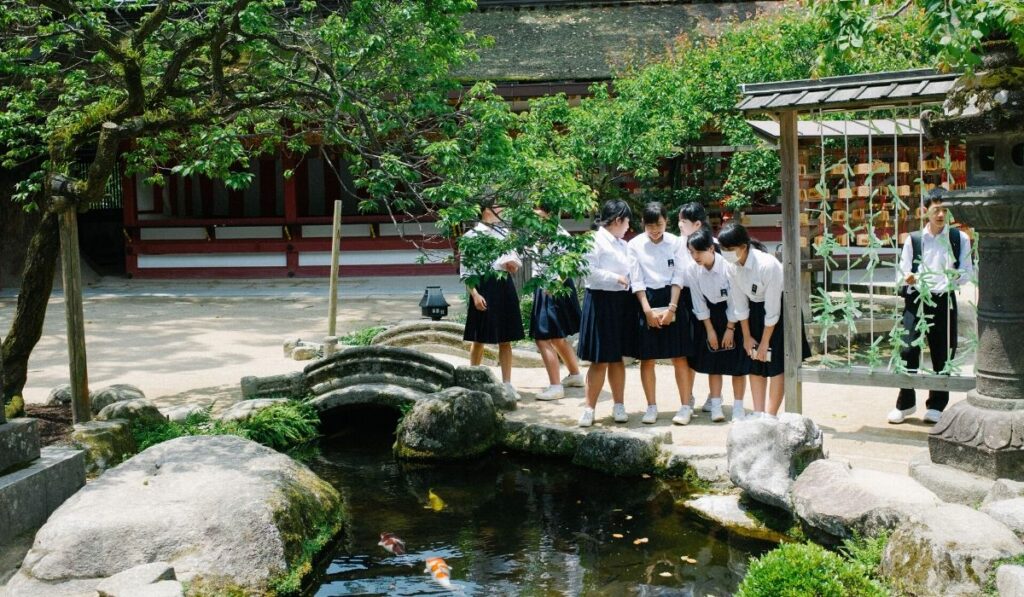
Teaching English in the land of the rising sun is a dream for so many people! Japan is one of the most popular destinations for ESL teachers with its high quality of life, mouth-watering cuisine and incredible culture.
Fortunately, becoming an English teacher in Japan is not a complicated process. It requires only a few things to get started.
Japan uses the Yen as its currency. ($1 = 105 Yen)
Requirements to Teach English in Japan
- Be a native speaker or have near-native command of the English language
- Hold a bachelor’s degree in any field
- Have an interest in Japan
- An updated CV/resume with good references
- A work visa
Where to Find a Teaching Job in Japan
Gaijinpot Jobs is a great place to start. They have a vast list of available positions nationwide and in various industries. Other great places to look at are Japan English Teacher and Daijob.
It is also worthwhile to check out the Teaching Job Board on GoOverseas.com. They update their list regularly!
Ways to Become an English Teacher in Japan
Jet Programme (ALT)
The Japan Exchanging Teaching program is a Japanese government initiative to hire university-educated ESL teachers in public schools all over the country. It is one of the most popular ways to become an English teacher in Japan. Since its inception, it has had over 70,000 participants.
- Through the JET program, you will be hired as an ALT (Assistant Language Teacher) in a public school. The responsibilities of your role are dependant on the curriculum and rules of your placement school.
- As an ALT, you are required to sign a one-year contract and can spend up to five years within the JET program.
- Work hours will be on weekdays at around 35 hours a week. Weekends are off, and you will get 20 paid vacation days yearly.
- Although you may submit a preference for where you would like to be placed, e.g. Osaka or Tokyo, your placement is ultimately determined by the program. So you may end up in the countryside, or somewhere you didn’t expect! What a fantastic experience!
- The program will reimburse you for your flights to and from Japan. They may provide subsidized housing depending on your situation.
Eikaiwa
Eikaiwa means for “English language conversation” in Japanese, and they are private ESL schools that act as a supplement the public English language education in Japan.
Unlike the JET program where you’ll be teaching in a classroom, Eikaiwa schools are usually one-on-one or smaller private lessons with a diverse range of students. You will be teaching high-school students, salarymen and people from other professions who are looking to advance their English education.
The main difference between working in an Eikaiwa and working as an ALT in the JET program is that the former is a private business. Therefore, you will be a member of a company and selling the product of English language teaching.
It is important to look at job reviews and check the reputation of the Eikaiwa school that you are considering to apply for!
List of Popular Eikaiwa Schools
Also, your schedule in an Eikaiwa is dependant on your assignments and not fixed on weekdays like it is working in a public school. However, you will get two days off a week regardless, so you although you might work on a Sunday, you could get a Monday or Friday off.
Universities
Teaching English in a post-secondary institution might seem like a considerable step above teaching in a junior-high-school as an ALT. Still, it’s an excellent way to gain valuable work and life experience. University ESL teachers’ salaries are also much higher than in other positions.
To become an English teacher at a university, you can apply through Westgate. To be eligible to apply, you will need at least a bachelor’s degree, a TEFL/TESOL certificate and 1000 hours of ESL teaching experience.
Interac
Similar to the JET program with the difference being that Interac is a private company rather than a government initiative. Therefore you will be given assignments from the company rather than your placement schools.
Interac tends to place ALTs in more rural areas as metropolitan placements are fiercely competitive.
JIEC
This program places ESL teachers with two years of minimum experience in private kindergartens around the country. If teaching young children is your calling in life, then this could be the perfect opportunity for you!
Horizon International School
A little different from regular schools in Japan. You will be teaching in an English speaking environment with students from multicultural backgrounds.
Horizon has some unique requirements, such as teaching experience in an international educational institute and planning after-school activities.
Things to Consider When Applying to be an English Teacher in Japan
You should always take into consideration as to why you want to teach in Japan. Make sure you research thoroughly about the country and culture and if possible, meet and talk to some Japanese people.
You need to be prepared to live in a rural countryside town, especially f you apply through the JET program or Interac. If you absolutely must live in the city, then your best bet would be to work for an Eikaiwa like Aeon or Berlitz.
You also need to consider how much everything will cost. Japan is one of the most expensive countries to live in so you’ll have to calculate your salary against your living costs and see how much you’ll be able to save per month.
Visa for English Teachers in Japan
To obtain the appropriate work visa to teach in Japan, you will need to acquire a job offer first. Public or Private institutions will hire you as long as you:
- Speak English (duh!)
- Have a bachelor’s degree
- Criminal record check
There are two types of visas that you can get to teach English in Japan. The instructor visa allows you to work in public schools and is what you’ll need for JET. The specialist in humanities visa will enable you to work for a private institution such as an Eikaiwa.
Do I need a university degree to teach English in Japan?
Yes, you do. To apply for various English teaching programs and the necessary visa, you will need to hold at least a bachelor’s degree in any field.
The only time you can teach in Japan without a degree and get paid is part-time work on a student visa (with a work permit and only up to 28 hours a week). When I was an exchange student in Tokyo back in 2018, I worked two part-time English teaching jobs which were great fun!
How much does an English Teacher in Japan make?
First-year JET participants receive an average yearly salary of ¥3,360,000, (¥280,000 or $2616 per month) with annual pay increases.
Eikaiwa schools pay ¥250,000 ($2336) a month.
Depending on your position and expertise, a university teaching role could earn you between ¥300,000 to ¥600,000 ($2800 – $5600) a month.
Private Tutoring could earn you around ¥3000 ($28) an hour. You will need to have a steady stream of students to create a sustainable income.
Do I need to know Japanese to be an English Teacher in Japan?
Not exactly. Your job requires you to teach and instruct in English, and the schools you will teach are very strict about this.
Being able to speak Japanese, even at a basic level will enhance your experience in Japan and improve your life. English proficiency is quite low in Japan (hence the high demand for English teachers). People may not be able to communicate with you if you only use English.
I highly recommend learning the language and taking the JLPT before coming to Japan. If you plan on working abroad in Japan, then you can start learning Japanese for free here.
What’s it Like to Teach in Japan?
Japan is unlike any other country in the world. It has this blend of technological modernity intertwined with natural beauty and rich culture.
I made acquaintances with many English teachers during my exchange program in Japan, and they all seem to enjoy their jobs. Convenience and safety are considered to be the biggest perks of working in Japan; however, you may suffer from a lot of stress from time to time due to the work culture.
If you’re planning on teaching abroad in Japan, I highly recommend that you do so! It will be an unforgettable experience, and you might end up living in Japan forever!

This site is owned and operated by AJM Laird. EnglishTeacherGuide.com is a participant in various affiliate programs designed to provide a means for the site to earn advertising fees by advertising and linking to products. We are compensated for referring traffic and business to these affiliate partners and other companies linked to on this site.

